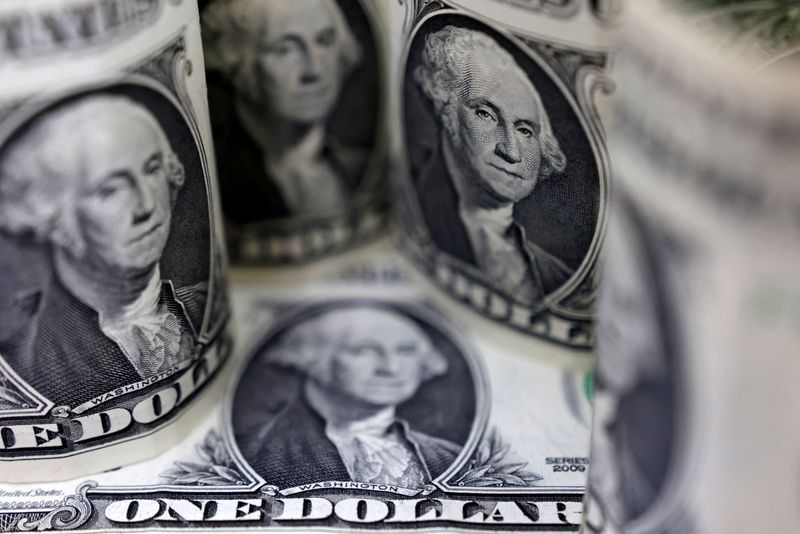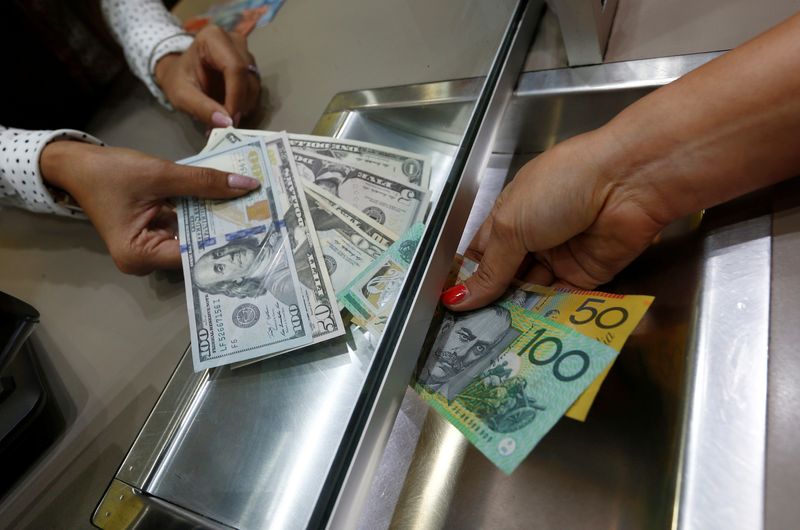By Saqib Iqbal Ahmed
NEW YORK (Reuters) -The dollar slipped against the euro on Wednesday, but its losses were capped as traders were hesitant to make any big bets ahead of next week's central bank meetings, including the Federal Reserve and the European Central Bank.
In addition, much of Asia is observing Lunar New Year holidays, leading most major currencies to cling to familiar ranges.
"Trading ranges remain remarkably compressed ahead of next week's central bank meetings," said Karl Schamotta, chief market strategist at Corpay.
Traders broadly expect the Fed to increase rates by 25 basis points (bps) next Wednesday, a step down from a 50 bps increase in December. Meanwhile, the ECB has all but committed to raising its key rate by half a percentage point next week.
"With global demand conditions holding up, inflation subsiding, and terminal rate expectations well below their peaks, last year's big directional trades have given way to a more nuanced landscape," Schamotta said.
Lack of any big U.S. data releases on Wednesday contributed to sluggish trading conditions.
Still, with the U.S. Commerce Department set to release its initial advance fourth-quarter gross domestic product estimates on Thursday, there was potential for market moves picking up later this week, Schamotta said.
"Surprises are possible in the gross domestic product and personal consumption numbers due tomorrow and the next day. If the post-pandemic era has taught us anything, it’s that 'bullwhip effects' can have deeply unpredictable consequences for the real economy," he said.
The euro was 0.23% higher at $1.0913, not far from the nine-month high of $1.0927 touched on Monday.
Data on Tuesday showed euro zone business activity made a surprise return to modest growth in January. Expectations of further rate increases by the ECB have also supported the euro.
German business morale improved in January, according to Ifo Institute survey data released Wednesday, as inflation eased and the outlook brightened.
In contrast, U.S. business activity contracted for the seventh straight month in January, data showed on Tuesday, though the downturn moderated across manufacturing and services for the first time since September.
The dollar was down 0.42% against the yen, at 129.615 yen per dollar, having hit a near eight-month low of 127.215 on Jan. 16.
Elsewhere, the Australian dollar surged to a more than five-month high on Wednesday after inflation data came in hotter than expected, bolstering the case for further rate increases from the Reserve Bank of Australia.
The Australian dollar was last up 0.76% to $0.7099.
Meanwhile, the New Zealand dollar was down 0.44% to $0.6479, after the country's annual inflation of 7.2% in the fourth quarter came in below its central bank's 7.5% forecast.
Sterling was 0.47% higher against the dollar in a choppy session after data showed British manufacturers unexpectedly lowered their prices in December, which suggested inflation may be easing, ahead of next week's Bank of England policy meeting.

The dollar rose 0.18% against its Canadian counterpart after the Bank of Canada on Wednesday hiked its benchmark overnight interest rate by 25 basis points to 4.5%, its highest level in 15 years, and said it would likely pause to measure the cumulative effect of previous increases.
Meanwhile, bitcoin was little changed on the day at $22,757, continuing to tread water after having jumped by about a third in value since early January, following steep losses after the high-profile collapse of the FTX crypto exchange.
